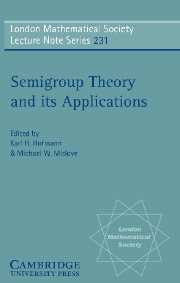 Semigroup Theory and its Applications
Semigroup Theory and its Applications Published online by Cambridge University Press: 05 April 2013
Introduction
The lambda calculus began as an attempt by Alonzo Church to give a foundation for mathematics based on functions rather than sets. As such, it inherently is a theory of functions. While interest in the theory was confined to logicians for quite some time, more recently it has received extensive attention from the theoretical computer science community, which took it up because of its emphasis on the computational aspects of functions. The lambda calculus has been a focus of research in the semantics of programming languages in recent years, and this area has become a major contributor to the development of the theory.
Category theory is another theory of functions, but one with quite different beginnings. It began in an attempt to abstract away from the details of specific areas of mathematics in order to provide a uniform setting in which results common to many areas could be formulated and proved. Category theory also plays a fundamental role in theoretical computer science, precisely because it provides a setting that is broad and rich enough to accommodate the many requirements needed to give mathematical models for programming languages.
It is only natural then that these two theories of functions should have a close relationship. One only has to consult works such as Asperti and Longo [2] and the earlier Lambek and Scott [8] to see ample evidence of the richness of the relationship between category theory and the typed lambda calculus.
To save this book to your Kindle, first ensure no-reply@cambridge.org is added to your Approved Personal Document E-mail List under your Personal Document Settings on the Manage Your Content and Devices page of your Amazon account. Then enter the ‘name’ part of your Kindle email address below. Find out more about saving to your Kindle.
Note you can select to save to either the @free.kindle.com or @kindle.com variations. ‘@free.kindle.com’ emails are free but can only be saved to your device when it is connected to wi-fi. ‘@kindle.com’ emails can be delivered even when you are not connected to wi-fi, but note that service fees apply.
Find out more about the Kindle Personal Document Service.
To save content items to your account, please confirm that you agree to abide by our usage policies. If this is the first time you use this feature, you will be asked to authorise Cambridge Core to connect with your account. Find out more about saving content to Dropbox.
To save content items to your account, please confirm that you agree to abide by our usage policies. If this is the first time you use this feature, you will be asked to authorise Cambridge Core to connect with your account. Find out more about saving content to Google Drive.